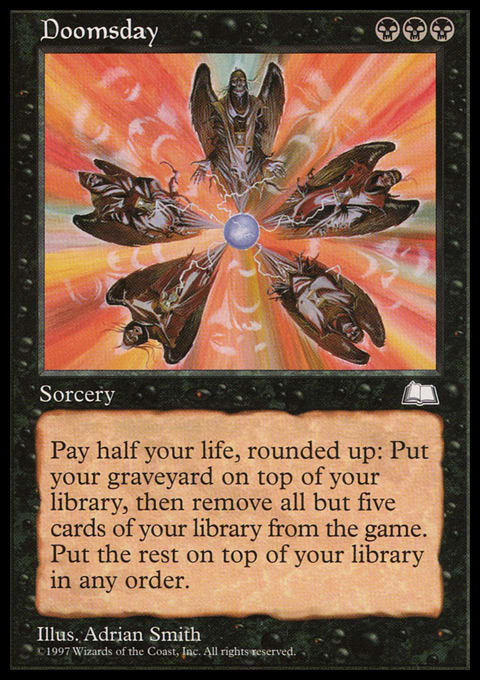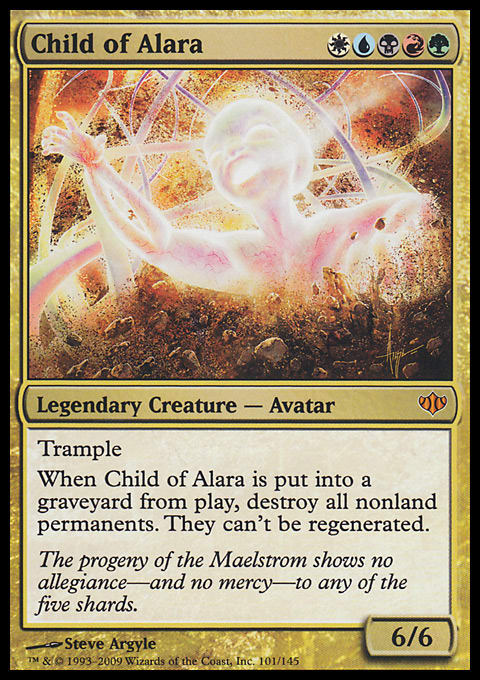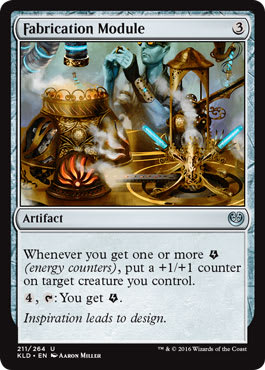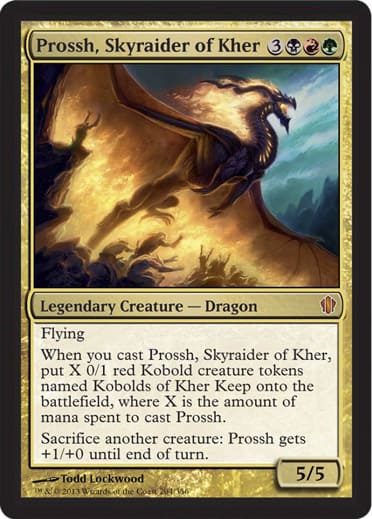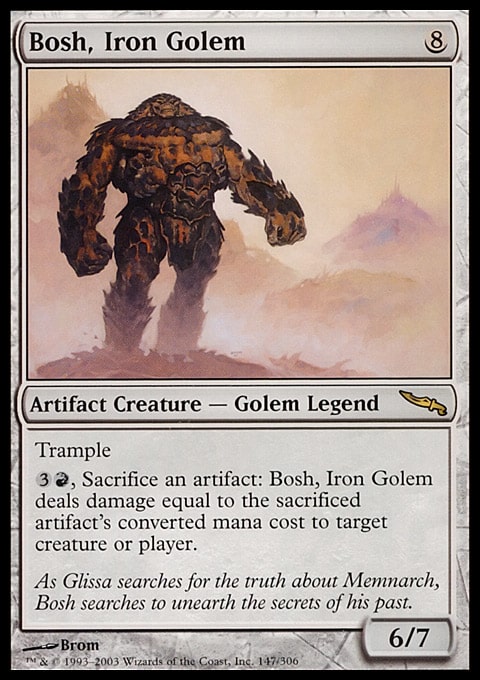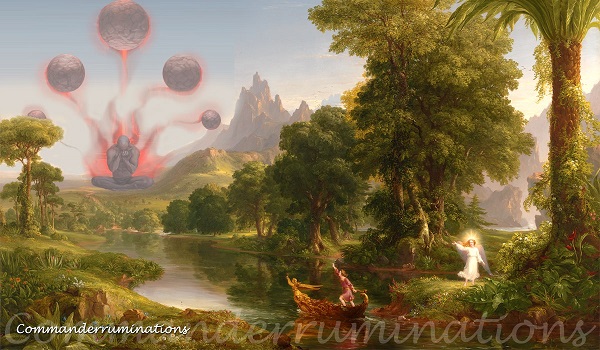
The Voyage of Life: Youth by Thomas Cole (1842). Doomsday by Noah Bradley.
I've noticed I use the term "midrange" a lot in my writing about Commander. While I enjoy writing about deck-building, I also enjoy writing about the format as a whole and today I'm going to dig into this word and try to explain how I look at Commander as a format.
Not a Pyramid Scheme
When you think of "cEDH", or "competitive" Commander play, it isn't uncommon to think of it as the pinnacle of Commander play. The ability to build and play decks that reliably win on or before turn five is a pretty impressive thing. The creation of a commander tier list, where a very small number of commanders are placed in the top tiers, helps to further the idea of a pyramid where hyper-competitive decks are at the top. You can check out the tier list here.
I don't think the range of commander decks that are actually out there looks like a pyramid. That would mean that there are very few highly competitive decks and the vast majority of decks are extraordinarily casual. I give folks more credit than that. I think the Commander meta is like a top.
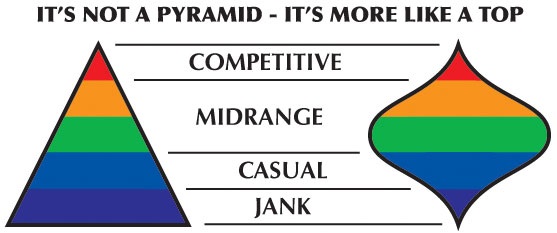
That might not make sense at first, but let's define our terms. For sake of clarity I'll leave Midrange for last.
Competitive
I think of a competitive, or "cEDH" deck as one in which it is designed to either out-race or reliably compete against decks that can win on or before turn five. That doesn't mean that your competitive deck will win by turn four, but if it can establish a lock that prevents other high tier decks from winning first, and if you can then grind out a win against those fast decks, that's just as effective.
It's worth mentioning that cEDH is also a philosophy where the sole focus of deck-building and play is to be as competitive as possible. There is no sentimentality, no pet cards, no whims, no price limit, no mercy and your goal is to win every single game. The card pool is limited because you only play the best, most powerful, most efficient options for everything you want to do regardless of how expensive the card might be.
By that definition, that would mean that you could have a "competitive" build for a commander that is not very powerful, is overcosted, or is even objectively bad. It might be a deck built with a competitive philosophy, but I don't think most players would think of it as a "competitive" Commander deck.
This is the part of the pyramid that feels accurate, and that makes it easy to imagine the rest of the format would fall into place to fill out an overall pyramid shape, where most players are at the bottom and only a few are at the top.
As a side note, your card pool in competitive Commander is actually quite small, because most cards just aren't good enough to be worthy of inclusion in a competitive deck.
Jank
The opposite end of the spectrum is usually called "casual" but I don't think that's fair to casual players. After some thought I'm calling the other extreme of commander decks "jank".
Jank decks are decks that have no real synergy, nothing but combat as your wincon, no tutors, and no real plan. These are usually going to be a player's first deck or a deck based very strictly around a theme of some sort.
An example of this might be the Commanders' Brew deck "Screaming Bald Guys". If you have no idea what I'm talking about, you can check out their podcast.
Those guys actually know what they're doing, so it's possible this deck is casual or even midrange, but I think you get my point. Screaming bald guys. All of them. Every single one. That feels like jank to me, and I actualy am a bald guy (not currently screaming).
A deck-build around a silly theme, like "Ladies Facing Left" doesn't have to be a jank deck. You can build a goofy theme but build with good cards, add synergy, and wind up with a deck that can actually win games.
Jank decks only win by accident or when the victory is pretty much handed to them, and they're so slow it will pretty much take forever. They generally don't have a plan, and they fold to any serious amount of removal or resistance.
Your card pool for a jank deck often winds up being large, but that doesn't help you very much. You have access to every card ever printed, but you might be building a jank deck because you're on a budget and you're only including cards that cost a quarter or less. You might be building a strange theme deck and you're not including any cards that feature men, monsters, and ladies facing right. Maybe you're only building with bearded men or people with visible tattoos. You might just not know enough about Magic to understand what makes cards good or powerful, so you're including bad cards just out of sheer inexperience.
It's easy and kind of fun to build a jank deck, but they tend to perform so badly that most players quickly move to building casual or even midrange decks just so they can have a chance at winning the occasional game.
Casual
A casual deck is a deck that is trying to "play fair", or is built by someone who doesn't yet understand and embrace all of the ridiculously "unfair" things you can do in Commander.
They usually aren't playing combos or tutors and don't include cards that are likely to give anyone the "feel bads".
They are also generally going to leave everyone else to their own devices. They won't be running much in the way of boardwipes or removal. To the truly casual player, removing people's things is rude, and if you don't want your stuff to be removed, it follows that you're not going to be removing anyone else's stuff. It's just not nice.
As with everything, there are exceptions.
You can certainly remove attacking creatures by blocking them and casual decks do like to go to combat. It's one of the first things you learn when you learn Magic. There's even a part of each turn dedicated to combat. It feels right and fair because learning about combat is a fundamental part of learning the game.
You can probably pack some removal but not a lot. You're going to have to luck into the right card at the right time rather than run efficient ways to draw or tutor into any answers you might need.
You can run combos, but they've pretty much got to be clunky, hard to assemble, inefficient, easy to interrupt and often not even game-winning.
You can definitely take a janky deck, add a little synergy, figure out what you want to do with it and wind up with a casual deck. It doesn't take much to come up from the bottom of the barrel, but you're going to wind up having games where it feels like you're playing with a jank deck every now and then. The bones of that jank deck are still there even if you've improved it and turned it into something that plays a little better.
The casual card pool is large, but doesn't include cards that will make your deck good. You can't be running a full slot of boardwipes in a casual deck, even if the rest of the deck is terrible.
Midrange
So if you aren't building a top-tier deck and you aren't building a casual or janky deck, you're somewhere in the middle, playing what I like to call "midrange" Commander.
Midrange is the level that I think most players wind up playing Commander at. The precon decks are all midrange decks, even if they have within them the makings of a competitive deck.
Whether they are more competitive or more casual midrange decks, these decks generally have a plan.
Whether or not a midrange deck slides up or down the scale depends upon a number of things.
Competitive midrange decks are good at executing their plan and will probably include tutors to help get to the cards they need to execute that plan. They will also have removal or counterspells to help make sure they have a good chance at protecting their wincon. The thing the deck is trying to do is more likely to feel "unfair" and involve a combo wincon. The presence of a combo wincon doesn't in itself make a deck competitive, but I think it's hard to build a competitive deck without one or without something that is roughly as effective as a combo. Competitive midrange decks also don't wait for their land drops and will aggressively work to both ramp and draw cards, as those are two of the most important ways to position yourself to win.
Casual midrange decks can run combos, tutors, removal, draw and ramp. The thing that will make them casual is usually that their plan is more "fair" or they are going light on some of those key categories to the point where the deck just isn't very good at executing their plan. A deck with no draw or tutors that happens to have both Sanguine Bond and Exquisite Blood doesn't automatically qualify as competitive because it contains a 2-card combo. The presence of a theme or tribal focus might actually pull a deck down into the casual midrange category if the theme is whimsical enough or the tribe is weak enough.
Commanders Matter
Without them, well . . . we wouldn't be playing Commander, would we?
Commanders also have a lot to do with where your deck will fall in the range of jank to competitive. The choice of who is leading your deck may affect your deck's power level, but on its own it doesn't actually place your deck into a tier.
What your choice of commander really does is determine the likely ceiling for your deck.
If you pick a commander who simply doesn't bring much to the party, it'll become that much harder to build a competitive or a "competitive midrange" deck. One might argue that you simply cannot build a true cEDH deck if your commander isn't in a select group of legendary creatures whose abilities lend themselves to building broken, super powerful decks.
While it is possible to build a competitive midrange, or even a lower level competitive deck around Prossh, Skyraider of Kher, it is quite possible to build a jank or casual Prossh deck as well. It might even be easier. If you remove every good card and play tribal "cards that rhyme with Prossh" you might be able to get there, though it's worth asking why anyone would do so.
When I first got into Commander, I didn't really know what I was doing and I built a bad Narset, Enlightened Master deck. I had heard she was strong, but without doing any research I just threw together a bunch of cards and gave it a go. It was terrible. I've now got a lower level competitive deck built around Narset with the usual turns and combat steps voltron strategy, and while it's a bit of a glass cannon, it is powerful and it is fun.
The bottom line is that you can build a great deck with a bad commander and you can build a bad deck with a great commander, but there are limits as to how consistent and strong your deck will be if your commander isn't integral to how you plan to win the game.
Midrange Matters
It's worth asking what drew me to want to write about this topic.
It feels obvious to me what "midrange" means, and I throw the term around a lot. I also see a lot of players online talk about how their decks are competitive and how certain players are casual. I suspect that the vast majority of these players are actually midrange players. They build decks that have a plan, have lots of good things going for them, but are either not quite on the level of competitive decks or are just a little too good to be called truly casual decks.
Lots of players want to pump themselves up or disparage other players by throwing around terms like competitive and casual.
You might think the trend is for folks to talk about the casual players like they're inferior and the competitive players like they're superior, but there are plenty of players who take the opposite view. To a laid back gamer who loves long, fun, durdly games where everyone has a beer and a laugh and nobody feels picked on or targeted, the term "competitive" might be something of an insult. I'm being a little hyperbolic, but my point is simply that "the top" doesn't have to be spun with the jank side down. You can just as easily value casual play or even pure jank above winning.
The reason I think Midrange matters is that what most of us really want is to play games in which everyone has a chance, everyone has fun, and the outcome isn't obvious at the start of the game.
You want suspense and excitement, and you're not going to get that with Food Chain Prossh versus Screaming Bald Guys, Ladies Facing Left, and a tribal Centaur deck.
I think it's not just OK to be building midrange decks, it makes for better games, less salt and a healthier playgroup. Also, you're probably playing midrange anyways, even if you keep telling folks you're a competitive player or you think you're as casual as casual can be.
The trick isn't just finding our common ground as Commander players, it's putting in the extra effort to try to make sure our games are balanced and fun.
Final Thoughts
While I really enjoy deck-building, I also enjoy thinking about Commander as a format. I look at the overall Commander meta a certain way and my view is shaped by the Commander league I run, the podcasts I listen to, and the games I play in.
I view "midrange Commander" as the juicy sweet spot in our format where all things are possible. We can play combo decks and tribal decks. We can play durdly decks, and we can play fast decks. We generally have a plan, but that plan is not to win the game so brutally fast that everyone else winds up being miserable if they aren't also playing a "cEDH" deck. We can play fair but we don't have to and the onus is on each of us to try to make sure our games are balanced and in the long run everyone has a good time.
If the philosophy behind competitive Commander is that playing at an optimal competitive level matters above all else, and the philosophy behind casual Commander is that "fun" matters above all else, I think the philosophy behind the midrange game is that winning and "fun" are definitely not the same thing, but are both important.
That's all I've got for you today. Thanks for reading and I'll see you next week!
















